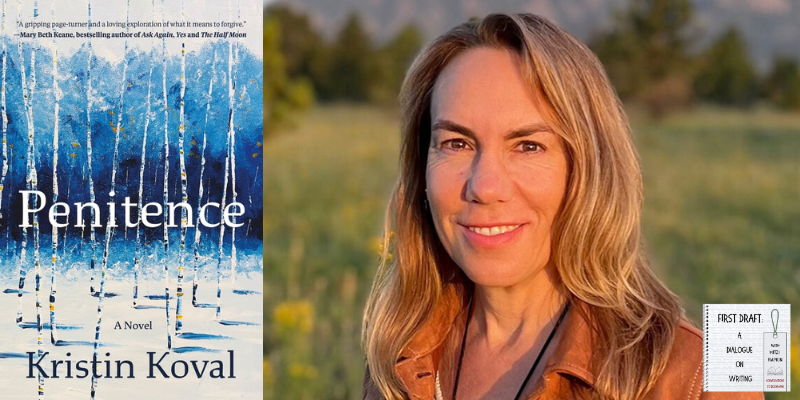
Kirstin Koval on the Layers of Empathy
In Conversation with Mitzi Rapkin on the First Draft Podcast
First Draft: A Dialogue of Writing is a weekly show featuring in-depth interviews with fiction, nonfiction, essay writers, and poets, highlighting the voices of writers as they discuss their work, their craft, and the literary arts. Hosted by Mitzi Rapkin, First Draft celebrates creative writing and the individuals who are dedicated to bringing their carefully chosen words to print as well as the impact writers have on the world we live in.
In this episode, Mitzi talks to Kristin Koval about her new novel, Penitence.
Subscribe and download the episode, wherever you get your podcasts!
From the episode:
Mitzi Rapkin: This novel is like a flower blossoming with all these different petals, because there’s so many different directions to look at and who has been wronged, and what has happened here. And we think when we open the book that we’re looking at this family of four and how they find forgiveness with the death that happened in front of them when the daughter killed the son. So, I think you’re leaving the reader with so much more to chew over as they leave the book. And I think that sometimes people want to have this really clean ending, and there are definitely some moments of grace at the ending, but I’m curious about leaving the reader with so much more to contemplate and how you crafted that. And I assume it’s intentional.
Kristin Koval: It was intentional. So, what I really wanted to do was leave the reader with something to think about when they were done. One of my very favorite movies is Inception, and I don’t know if anybody here in the audience has seen it, but it’s all about dreaming and layers of dreaming. And at the end of the movie, you don’t know if the main character, who’s played by Leonardo DiCaprio, is still dreaming or not. And you can analyze it as much as you want and go back, but you’ve got to think about it over and over and over again. And that was kind of what I wanted the reader to do. And the reason actually goes back to the epigraph at the very beginning of the novel, the Bryan Stevenson epigraph that says, “Each of us is more than the worst thing that we’ve ever done.” I think that all of us make mistakes in our lives and big mistakes. I don’t mean I forgot to load the dishwasher before I left for work. I mean big mistakes that might have hurt another person. I don’t necessarily mean a murder. But I do think that each of us, whether we did it when we were, you know, 13 or 23 or 50 or 86, we’ve all done something where we regret it and we feel bad about it, and that’s our mistake to live with. But we are all more than that mistake. We’re hopefully better than that mistake. And if we can realize that each of us, everybody in this room, has done something wrong, it can hopefully allow us to empathize a little bit more with each of the characters in this novel. And if you can empathize with each of those characters, hopefully you can eventually grant them mercy. And if you can grant the characters mercy, hopefully someday you can also land on forgiveness, and all of those things are tied together; the empathy, the mercy and the forgiveness, and you need all of them to work together, I think. And if I had tied everything up in a neat bow, I think readers would have closed the book and moved on and maybe forgotten to keep thinking about the fact that they need empathy and mercy and forgiveness in their lives, because we all need other people to grant us empathy and mercy and forgiveness. I know I’ve needed it in my life. I shouldn’t speak for everybody else here, but I have needed it, so I think it’s a good idea for us to grant it to others.
***
Kristin Koval is a former lawyer who always wanted to be a writer but initially wandered down other paths. She attended Phillips Exeter Academy, Georgetown University and Columbia Law School. She lives in Boulder, Colorado and Park City, Utah with her husband, two sons and two Great Danes.
First Draft: A Dialogue on Writing
First Draft: A Dialogue on Writing is a literary podcast produced and hosted by Mitzi Rapkin. Each episode features an in-depth interview with a fiction, non-fiction, essay, or poetry writer. The show is equal parts investigation into the craft of writing and conversation about the topics of an author’s work.



















